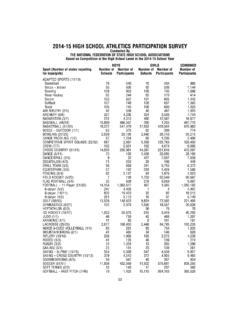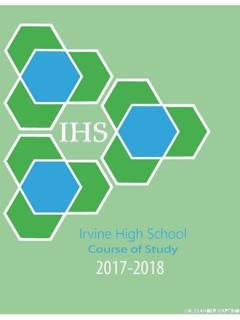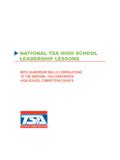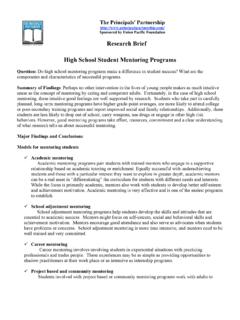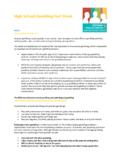Transcription of Planning for Your Transition from High School to …
1 Planning for Your Transition from high School to Adult Life A workbook to help you decide what you want your life to look like after graduation . And to help you outline the steps so you can make it happen! By Ellen Condon & Kim Brown Design by Jillian Jurica Table of Contents Transition from School to adult life: It's never too early to start Planning 5. What do I want my life to look like after high School ? Step One: Answer the question, What is my day going to look like after high School ? 9. What do I do now? How much help and support do people give me now? What are my skills and abilities today?
2 Step Two: Assess how you are doing right now. 23. How do I get from where I am now to where I want to be when I. graduate? Step Three: Make a list of what you could learn to do, or what steps you could take to get closer to these goals before you graduate. 35. What agencies can help me get to where I want to be after graduation? Step Four: Think about who can help you meet your goals and continue setting new ones. 45. Planning Workbook 1. About the Rural Institute The Rural Institute: Center for Excellence in Disability Education, Research, and Service, is one of sixty-four Centers for Excellence in Disability Education across the nation.
3 It is an inter-disciplinary organization that promotes full participation in rural life for individuals with disabilities. The Rural Institute accomplishes this goal by developing and disseminating innovations in teaching, research, community supports, and policy advocacy. This publication was produced by the Transition Projects at The Rural Institute: Partnerships for Transition , which is funded under a contract with the Montana Council on Developmental Disabilities, and MT-TIRC (#90DN0223/01), awarded by the Department of Health and Human Services, Administration for Children and Families, Administration on Developmental Disabilities.
4 The focus of this publication is on work associated with these Rural Institute Transition projects. Opinions expressed here do not necessarily reflect the positions or policies of the funding organizations. These are a few of the many projects at The Rural Institute. This publication does not encompass all of the projects and activities currently underway at The Rural Institute as a whole. The Rural Institute: Center for Excellence in Disability Education, Research, and Service 634 Eddy, 009 CHC, University of Montana Missoula, MT 59812. Telephone: (406) 243-4134, TT: (406) 243-4200, FAX: (406) 243-4730.
5 Web Site: 2 Planning Workbook The purpose of this workbook is to help youth to take the lead in Planning for their adult lives. The workbook shares important information, encourages youth to begin thinking about life after high School , and offers ideas they can use to plan routes to reach their goals. This is not a workbook parents, educators or others should hand to young adults and ask them to complete on their own. Rather, it should be used as a guide for conversations, either one-to-one or in groups, between adults and between young people. The workbook includes suggested activities, but don't be limited to these - be creative!
6 Note to Teachers: You might want to photocopy the activity pages of this workbook and keep the extra copies in a binder. This way, you can use the workbook with multiple students. Planning Workbook 3. 4 Planning Workbook Transition from School to adult life: It's never too early to start Planning While graduation from high School is a natural life event for many teenagers, for students with disabilities this requires more Planning , negotiation, and decision making. Your choices about where you want to live and work and whether or not you want to continue your education are a bit more challenging if you will need continued support or accommodations.
7 high School is the last time you will be entitled to receive services. So make the most of your time there. Have a plan for when you graduate and connect with new supports or service agencies before you graduate from high School . IDEA 2004, the law that directs schools about helping you plan for your adult life, states that Transition Planning must be part of the Individualized Education Program (IEP) which covers the time period when you turn 16. That means that your IEP team will want to know what your goals are for after you leave high School . For example, where do you want to live?
8 Who do you want to live with? Do you plan to rent an apartment or buy a home? What will you do for work? What will you do for fun? What places or events will you want to go to in your community? How will you get around? These post- School goals will help you and your team decide what classes you should take and what things would be helpful to teach you to prepare you for the adult life that you want. Even though the IEP doesn't start talking about life after School until you are 15 or 16, you and your family need to start thinking about your future much earlier. Parents don't usually wait until their kids are 16 to talk to them about getting a job and supporting themselves after high School - start talking and thinking NOW.
9 About what you want your life to be like once you no longer attend high School . Encourage your parents to have high expectations for you. Have high expectations for yourself. Once Transition starts being discussed at your IEP meetings, you need to be invited to the meetings so you can add your input. It is your life after all! This workbook Planning Workbook 5. is meant to help you think about Transition and what you want to do, what you need to learn in School , and what supports you might need to live, work and play as independently as possible. For you to direct your future at your IEP meetings it will help if you think about this ahead of time and go to your meetings prepared.
10 To prepare for your first Transition Planning meeting, think about all your strengths . the things you are good at. If you need help, ask your family, friends, and teachers what they think you are good at. Make a list and bring it with you to your meeting. Also make a list of things you like to do, your interests. Most importantly, spend some time thinking about what you want your day to look like the day after you graduate from high School . Fill out this workbook and bring it to your Transition Planning meeting to make sure that your IEP team knows what your thoughts are about your future.
